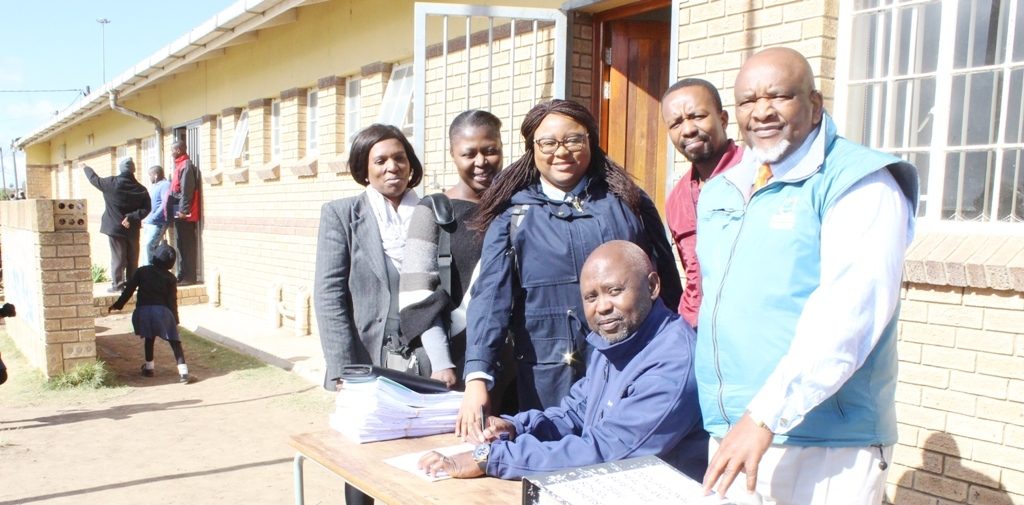Two Grahamstown (Makhanda) primary school principals are thrilled that work is set to start this week on early childhood development centres (ECDs) at their schools. The sites were handed over to contractors during meetings on Tuesday 7 August 2018.
When the 2020 intake of Grade Rs take their first excited steps into Samuel Ntlebi and NV Cewu primary schools in Joza’s Ward 2, they should be enjoying dedicated ECD facilities. A third school in Ward 2, CM Vellem Primary, has also been identified for Grade R facilities; however, they have hit some stumbling blocks in the land allocation process. Three separate contractors were to have begun work on 2 August.

Grade R is the first year of the foundation phase of outcomes-based education at public primary schools. Based on the Schools Act it is for children age four turning five by 30 June in the year of admission. The Department of Basic Education committed to introducing compulsory Grade R by 2019.
Dumakazi Myemane has taught at Samuel Ntlebi Primary School for 21 years and will be retiring soon.
The Grade R block at Samuel Ntlebi was supposed to have been completed in 2015. With 42 Grade Rs this year and no proper furniture, toilets or playground for the little ones, it’s been a struggle.
“It’s a great relief to have this built,” Myemane said.
The contractor at Samuel Ntlebi is East London based company Memoir. Site agent Pula Dlamini estimates the project will take seven months to complete.

NV Cewu principal Phumeza Mqubuli was also thrilled. The school has two Grade R classes this year and a total of 80 children are accommodated in a converted toilet block.
Contractor Thanduxolo Zuka of East London based Basadzi Contruction said with the NV Cewu site handed over on Tuesday, they would start setting up the site on Monday 13 August. He estimated the project would take 10 months to complete.
The implementing agent for all three is Coega Development Corporation and representatives from CDC, the Department of Basic Education and the Department of Social Development, along with SGB members, Ward 2 councillor Rami Xonxa and the Ward 2 committee chairperson attended the handover meeting.
National policy on ECD is based on research that shows a child’s foundation in their early years determines the chance they have for a high quality life in adulthood. From birth to age 5 is critical and ECD is intended to prepare children for primary school education.
A paper titled Early Childhood Development and South Africa: A literature review by Mbarathi et al says “Adequate government support in early childhood education can reduce grade repetition and school dropout rates, enhance social mobility within poor households and reduce the cost burden on welfare and the criminal justice system. This government support will further reduce the inequality gap within low income groups and hence reduce cyclical poverty. Overall, quality ECD education brings about positive outcomes in a society.”
As a former teacher, education is close to Ward 2 Councillor Rami Xonxa’s heart.
“It is not beyond our power to create a world in which all children have access to a good education,” Xonxa said. Educating all of our children must be one of our most urgent priorities. We all know that education, more than anything else, improves our chances of building better lives.
He urged community members to make sure the facilities were used well.
“Early Childhood Development is a very important phase of human development and as the community we must make sure that no children are allowed to roam around the streets during the time when they are expected to be at school.”
He also said it was up to the community to protect the facilities against vandalism. “Let us own them,” he urged.

Why it matters
South Africa has had two preschool systems: one government funded and regulated by provinces; the other independent and run by NGOs or private businesses. Preschool programmes comprise pre-Grade R (0-4 years old) and Grade R programmes (5-6).
Grade R is incorporated in the Foundation Phase (up to Grade 3) and is compulsory.
Far-sighted policy researchers have recognised Early Childhood Development as crucial to laying the foundation for further education and training, thus breaking the cycle of poverty. In South Africa, at least in theory, ECD starts with prenatal care and continues through Grade 3.
In SA’s Medium Term Strategic Framework (2014 to 2019), high-quality, universal early childhood education is one of the in the National Development Plan 2030 goals. It includes improved Grade R provision and planning for the extension of early childhood development.
Government departments (Health, Social Development and Basic Education) in partnership with NPOs and formal ECD centres, all have roles in undertaking their tasks on ECD, along with their own policies and budgets. Local government and the Department of Social Department are required to work together to improve infrastructure for ECD within a municipality.
The Department of Basic Education (DBE) focuses on children in Grade R and their statutory role is the provision of infrastructure, resources and programmes for these learners.
Additional sources
* Education series II: Focus on schooling in Eastern Cape report released by Statistics South Africa (Stats SA) www.statssa.gov.za
* Early Childhood Development and South Africa: A literature review Technical paper No. 6 (2016) Authors: Mbarathi, N., Mthembu, M. E. and Diga, K. Author Contact: Kathleen Diga, University of KwaZulu-Natal, School of Built Environment and Development Studies. Email: digak@ukzn.ac.za
* Brand South Africa: https://www.brandsouthafrica.com/governance/ndp/quality-basic-education



